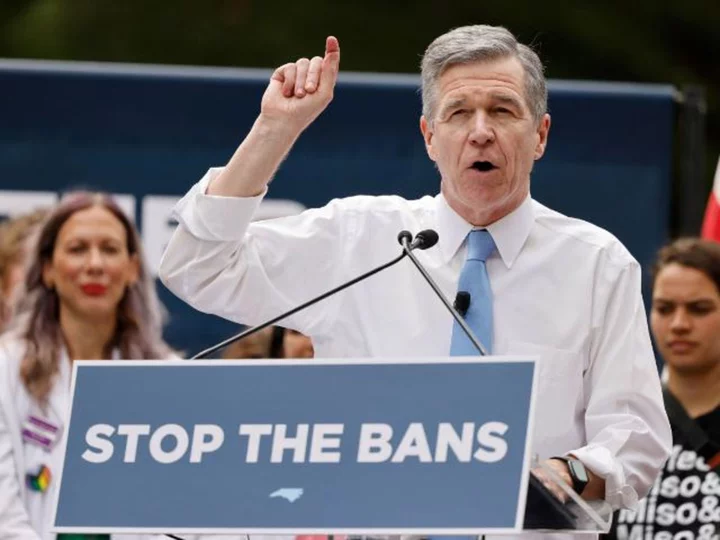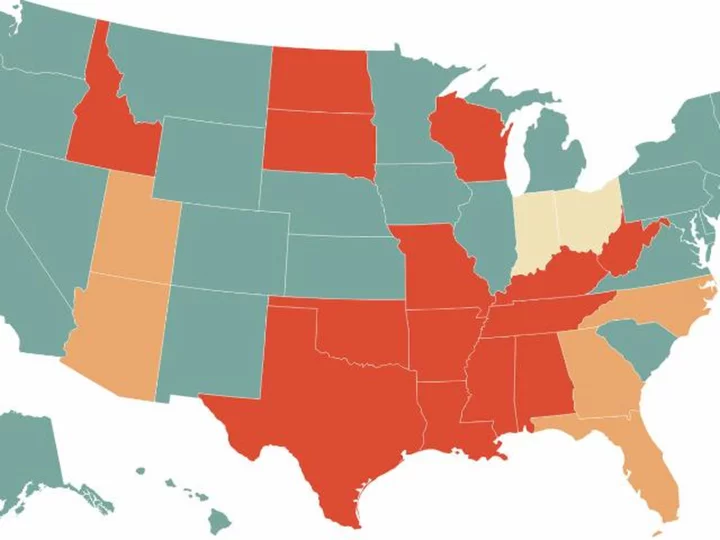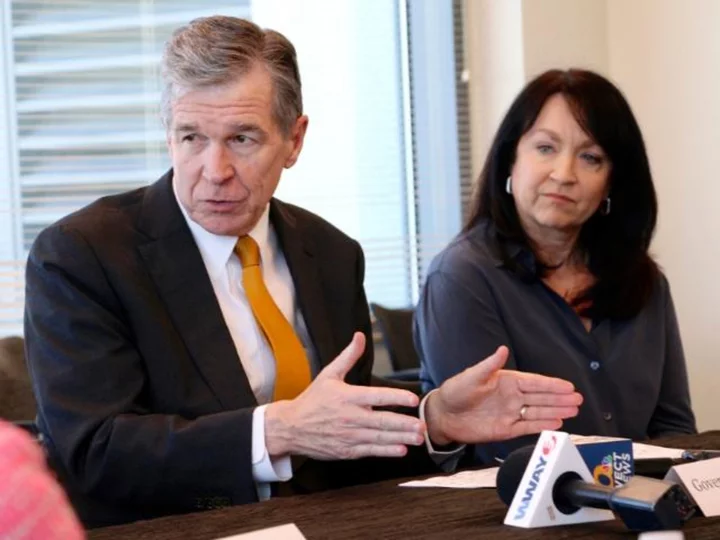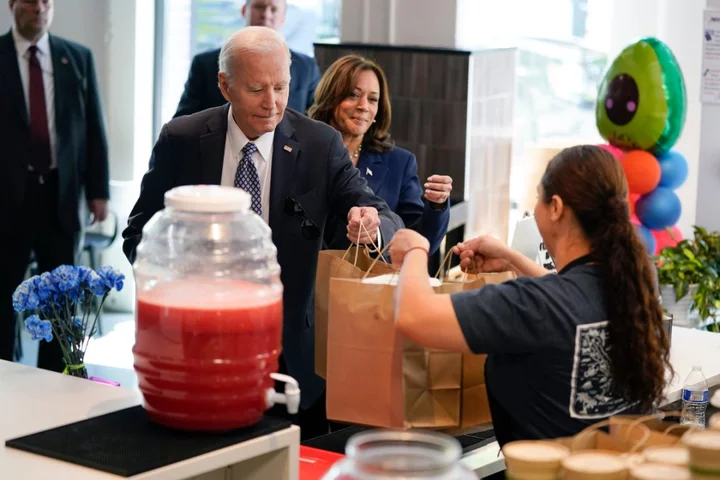
North Carolina Senate overrides governor's abortion ban veto
North Carolina's Republican-led Senate on Tuesday voted to override a veto from Democratic Gov. Roy Cooper over a bill that would ban most abortions after 12 weeks.
2023-05-17 05:51

One vote to redraw the US abortion rights map
One vote can change everything, especially when things are close.
2023-05-16 06:28

North Carolina Democratic governor vetoes abortion ban, setting up likely override vote
North Carolina Democratic Gov. Roy Cooper vetoed a controversial bill that would ban most abortions after 12 weeks, setting up a likely override effort from the state legislature, where Republicans have a supermajority.
2023-05-14 00:45

North Carolina governor vetoes 12-week abortion ban, launching Republican override showdown
In front of an exuberant crowd, North Carolina’s Democratic governor vetoed legislation Saturday that would have banned nearly all abortions in his state after 12 weeks of pregnancy. Hundreds of abortion-rights activists and voters watched on a plaza in the capital of Raleigh as Gov Roy Cooper affixed his veto stamp to the bill. The veto launches a major test for leaders of the GOP-controlled General Assembly to attempt to override Cooper’s veto after they recently gained veto-proof majorities in both chambers. The bill was the Republican response to last year’s US Supreme Court decision overturning Roe v Wade. "We’re going to have to kick it into an even higher gear when that veto stamp comes down,” Mr Cooper told the crowd. “If just one Republican in either the House or the Senate keeps a campaign promise to protect women’s reproductive health, we can stop this ban.” Andrea Long, a 42-year-old mother of three from Cary, said she was honored be part of an “electric” crowd on what she called a “historic day for freedom” in North Carolina. “I couldn’t stop crying tears joy seeing the governor hold up the veto stamp, but I know it’s an uphill battle to keep this momentum going,” Ms Long said. Mr Cooper, a strong abortion-rights supporter, had until Sunday night to act on the measure that tightens current state law, which bans most abortions after 20 weeks of pregnancy. Mr Cooper spent the week on the road talking to North Carolinians about the bill’s lesser-known impacts and urging them to apply pressure upon key Republican lawmakers who hesitated about further restrictions during campaigns for office last year. The legislation passed along party lines in the last week in the House and Senate. Republicans have pitched the measure as a middle-ground change to state abortion laws developed after months of private negotiations between House and Senate GOP members. It adds exceptions to the 12-week ban, extending the limit through 20 weeks for rape and incest and through 24 weeks for “life-limiting” fetal anomalies. But Mr Cooper has said repeatedly the details contained in the 47-page bill show that the measure isn’t a reasonable compromise and would instead greatly erode reproductive rights. He cites new obstacles for women to obtain abortions — such as requiring multiple in-person visits, additional paperwork to prove a patient has given their informed consent to an abortion and increased regulation of clinics providing the procedure. Mr Cooper and allies have said those changes in practice will shut down clinics that cannot afford major upgrades mandated by new licensing standards and make it nearly impossible for women who live in rural areas or work long hours to access abortion services. Compared to recent actions by Republican-controlled legislatures elsewhere, the broad prohibition after 12 weeks can be viewed as less onerous to those in other states where the procedure has been banned almost completely. But abortion-rights activists have argued that it’s more restrictive than meets the eye and will have far-reaching consequences. Since Roe was overturned, many patients traveling from more restrictive states have become dependent on North Carolina as a locale for abortions later in pregnancy. Republicans call the legislation pro-family and pro-child, pointing to at least $160m in spending contained within for maternal health services, foster and adoption care, contraceptive services and paid leave for teachers and state employees after the birth of a child. Mr Cooper has singled out four GOP legislators — three House members and one senator — whom he said made “campaign promises to protect women’s reproductive health.” Anti-abortion groups accused Cooper of trying to bully them. One of those House members is Rep Tricia Cotham of Mecklenburg County, who voted for the bill mere weeks after she switched from the Democratic Party to the GOP. The move gave Republicans a veto-proof supermajority if all of their legislators are present and voting. Ms Cotham has spoken out for abortion rights in the past and even earlier this year co-sponsored a bill to codify abortion protections into state law. Rep Ted Davis of Wilmington — another targeted legislator — was the only Republican absent from last week’s initial House vote. The Senate margin already became veto-proof after GOP gains last November. Mr Davis said last fall that he supported “what the law is in North Carolina right now,” which was a 20-week limit. Davis has declined to comment on the bill, but House Speaker Tim Moore said recently that Davis is a “yes” vote for an override. Read More Faith leaders speak out against ‘toxic’ Christian nationalist conference arriving at Trump’s Miami resort GOP boycott in Oregon threatens abortion, transgender bills and protesters' own political careers Louisiana Republicans refuse rape and incest exceptions to state’s sweeping anti-abortion law Ukraine war’s heaviest fight rages in east - follow live Charity boss speaks out over ‘traumatic’ encounter with royal aide
2023-05-14 00:45

Louisiana Republicans refuse rape and incest exceptions to state’s sweeping anti-abortion law
Louisiana Republicans have refused to add exceptions for rape and incest to one of the strictest anti-abortion laws in the country after the US Supreme Court revoked a constitutional right to abortion access. The state’s anti-abortion Democratic Governor John Bel Edwards opposed the exclusion, but he signed the state’s anti-abortion law last year despite pleas from abortion rights advocates to veto the measure. This year, state Rep Delisha Boyd introduced a bill that would amend the law to add exceptions for pregnancies from rape or incest, but lawmakers on a state House committee voted down the proposal, effectively killing it for the remainder of the legislative session. On 10 May, the committee struck down the bill after hearing testimony from rape survivors and abortion rights advocates who shared their experience and urged lawmakers to support survivors. Lawmakers voted 10-5 on party lines to keep exemptions from rape or incest out of Louisiana’s anti-abortion law. Lawmakers also heard from anti-abortion activists and John Raymond, a former Survivor contestant and pastor accused of taping students’ mouths shut and hanging another student by his ankles. Mr Raymond, who has pleaded not guilty to the allegations, told the committee that women will “clamor to put old boyfriends behind bars in order to dispense with the inconvenience of giving birth” if the state allows rape survivors to access abortion care. In this year’s legislative session, lawmakers are considering a package of bills aimed at loosening the state’s near-total ban on legal abortion care, but most of the proposals have been shelved. During the committee hearing, Ms Boyd revealed that she was born after her mother was sexually assaulted when she was 15 years old. “My mother never recovered,” she said. “No one looked after my mother. No one looked out for me.” Republican state Rep Tony Bacala said he opposed the legislation by pointing to Ms Boyd, who was born from rape, as a good person. In a statement, the governor said he was “deeply disappointed” by the vote. “The committee’s decision to prevent this important bill from being debated by the full House is both unfortunate and contrary to the position of a vast majority of Louisianans, who support these exceptions,” he added. “I simply do not understand how we as a state can tell any victim that she must be forced by law to carry her rapist’s baby to term, regardless of the impact on her own physical or mental health, the wishes of her parents, or the medical judgment of her physician,” said the anti-abortion Democratic governor, who signed the law that bans nearly all abortions, without exceptions, last year, despite pleas from abortion rights advocates to veto the bill. “As I have said before, rape and incest exceptions protect crime victims,” he added. Roughly 3 million women in the US have experienced rape-related pregnancy during their lifetime, according to the US Centers for Disease Control and Prevention. Louisiana also had one of the highest maternal mortality rates in the nation, disproportionately impacting Black women, according to the state’s Department of Health. Louisiana is among more than a dozen states, mostly in the South, that have effectively outlawed or severely restricted access to abortion care in the wake of the Supreme Court’s decision last year to reverse the half-century precedent for abortion access affirmed by Roe v Wade. The state also is central to a closely watched case that could determine the future of a widely used abortion drug used in more than half of all abortions in the US. The legal case over the federal government’s approval of mifepristone will return to the Fifth Circuit Court of Appeals in New Orleans on 17 May, the next step in one of the biggest abortion rights cases after the fall of Roe. The Supreme Court’s decision on 21 April maintains the US Food and Drug Administration’s approval of the drug after a federal judge in Texas struck it down in a ruling that would have profound and potentially dangerous consequences for millions of Americans if allowed to go into effect. A three-judge panel at the federal appeals court in Louisiana will hear arguments in the case next week. Read More Alabama Republicans would charge abortion patients with murder under proposed legislation A Texas man sued his ex-wife’s friends for allegedly helping her with an abortion. Now they’re suing him McConnell opposes Alabama Republican's blockade of military nominees over Pentagon abortion policy
2023-05-12 07:21

Jill Biden is trying to change Biden’s childlike diet
First lady Jill Biden is reportedly unsatisfied with the substance of President Joe Biden’s diet. According to a report from Alex Thompson at Axios, Ms Biden is urging the president to eat more vegetables and fish with his re-election campaign underway and a vast number of Americans concerned about his age and fitness to serve. Per Axios, Mr Biden is not thrilled about efforts to have him eat healthier. The president’s favourite foods are said to include peanut butter and jelly sandwiches, BLT’s, pizza, and spaghetti with butter and red sauce, as well as ice cream. Whether or not Mr Biden’s diet has any significant bearing on his fitness is difficult to determine. Mr Biden works out daily with a personal trainer, and his doctors have declared that he is in fine health. The extent to which a person’s diet determines their overall health is generally difficult to determine, with a host of other environmental and genetic factors contributing. But the attention being paid to Mr Biden’s diet comes as he embarks on what will be a gruelling re-election campaign that could be complicated by perceptions about his health. According to a recent ABC News/Washington Post poll, two-thirds of Americans believe Mr Biden is too old to serve a second term. Just as importantly, Americans at this stage see former President Donald Trump — Mr Biden’s likely opponent — as mentally sharper. The irony is that Mr Trump, who is just four years younger than Mr Biden, also dealt with consternation over the makeup of his diet when he was president. Mr Trump, who once served a national championship-winning football team a meal of McDonalds products, reportedly so disliked vegetables that his staff resorted to sneaking them into his food. Mr Trump reportedly skipped meals with some frequency, but regularly enjoyed fast food spreads including hamburgers, pizza, fried chicken, and fried fish. There is one other dietary similarity between Mr Biden and Mr Trump: neither man drinks alcohol. Mr Biden reportedly enjoys orange Gatorade, while Mr Trump is reportedly fond of Diet Coke. Read More Trump doctor says staff hid cauliflower in president’s mashed potato in failed attempt to make him lose weight Crabcakes, ribs, banana splits for S. Korea state dinner
2023-05-10 03:21
